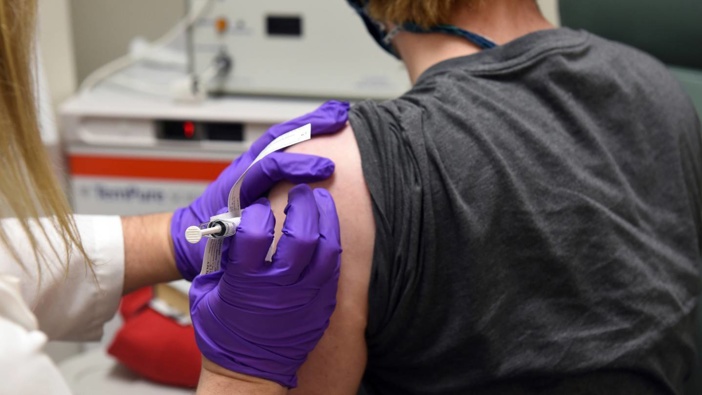Experts were surprised and mildly troubled by a poll that found 35 per cent of New Zealanders are unlikely to get a Covid-19 vaccine immediately - but they expect the rate will improve during the course of the year.
Scientists told NZME the major reason why New Zealanders said they were reluctant to get a Covid-19 vaccine - "I'd rather wait and see if others who have taken it suffer any side effects" - was a problem of education and familiarity.
Otago University immunologist Jo Kirman said New Zealand has a culturally diverse population.
She told Mike Hosking different cultures will make decisions differently - and believes seeing famous people and celebrities getting the vaccine will be one piece of the puzzle.
"While some people are easily swayed by seeing The Queen getting the vaccine, other people might want different information or information given to them in a different way."
Kirman said widespread vaccination will help New Zealand achieve herd immunity and protect those most vulnerable.
"There are people in the community who can't get vaccinated because they get allergic reactions or they are under immuno-suppressive treatment."
University of Otago epidemiologist Professor Michael Baker said the 35 per cent vaccine reluctance number in the Ministry of Health's December 2020 poll was higher than he would expect but not necessarily cause for concern.
"Because we've had more than a year of really intense publicity around the pandemic now I think everything about it has elements of anxiety and perhaps even outright fear for many people.
"Because it's a new virus, it's a new vaccine, I think it's understandable some people say they would like to wait to see how it goes."
New Zealand's isolation from the brunt of the pandemic's worst affected countries also played a part, Baker suggested.
"Because the harm caused by the pandemic is quite far removed from New Zealand, so we don't know people who are dying and the people I know in New Zealand who know people who have died are all family and friends overseas," Barker said.
"So for many New Zealanders the threat is quite distant but also the vaccines are quite distant. I would say at the moment these figures aren't particularly cause for concern. It just means that the educational challenge is definitely there with the vaccine rollout."
Professor Michael Baker, epidemiologist at the University of Otago Wellington's Department of Public Health. Photo / Elisabeth Easther
The ministry has released full results of polling into attitudes to the vaccine rollout, following an Official Information Act request from the Herald, and having earlier publicised only top-line findings.
According to the full ministry report on the December 2020 survey, 69 per cent of people would be prepared to accept a "well-tested and approved" Covid-19 vaccine, while 24 per cent were unlikely to. Eleven per cent (an estimated 391,900 adults) said they definitely wouldn't.
Victoria University of Wellington clinical psychologist Dr Dougal Sutherland said he was not particularly concerned about 11 per cent totally reluctant to a vaccine, but the 24 per cent "unlikely" to try a vaccine immediately was "troubling".
"It does seem quite high. The governing knowledge is there's always going to be a core of people who are probably going to be unwilling to take a vaccine of whatever form.
"My understanding is that 10 per cent is relatively consistent across populations is that there's often that 10 per cent core of anti-vaxxers who are never going to take it. But I'm more surprised by the 24 per cent. That seems really high to me.
"To me that's a really troubling thing and I really strengthened those calls for the Government to get onto a campaign around encouraging people to take it. It has to be a subtle campaign in terms of providing people with facts and role models.
"I think often people's immediate response is to tell people that are vaccine hesitant that they're just stupid or they should just take it and stop being ridiculous but I think we're well past the days where yelling loudly and telling them they're dumb actually changes their minds."
Dr Siouxsie Wiles, an infectious diseases specialist from the University of Auckland. Photo / File
University of Auckland Associate Professor Siouxsie Wiles said concerns around the totally normal side effects had been "weaponised" by certain groups to rouse fear.
"I guess the important thing is that people understand that some side effects are completely natural and to be expected. For example some people experience a fever for a few days.
"Others have a sore arm. These are all completely natural responses. That is your body mounting an immune response which is exactly what you're being given a vaccine to do, right.
"A lot of the information on side effects I think is almost being weaponised by people who have an anti-vaccine agenda."
University of Canterbury Professor Michael Plank also pointed out that public opinion would quite possibly have changed since the ministry report's polling period of December 2020.
"It's definitely a fast-moving question, so it possibly would have changed a bit since December," Plank said.
"Certainly since December we've got a lot more data because we've had millions and millions of doses around the world so the data is really there now for people to see and it probably wasn't in December.
"New Zealand's in a lucky position in a sense because we are benefiting from being able to watch what happens with these vaccines in other countries around the world, so we can benefit from a lot more data that comes in on things like side effects."
text by Tom Dillane, NZ Herald
Take your Radio, Podcasts and Music with you










